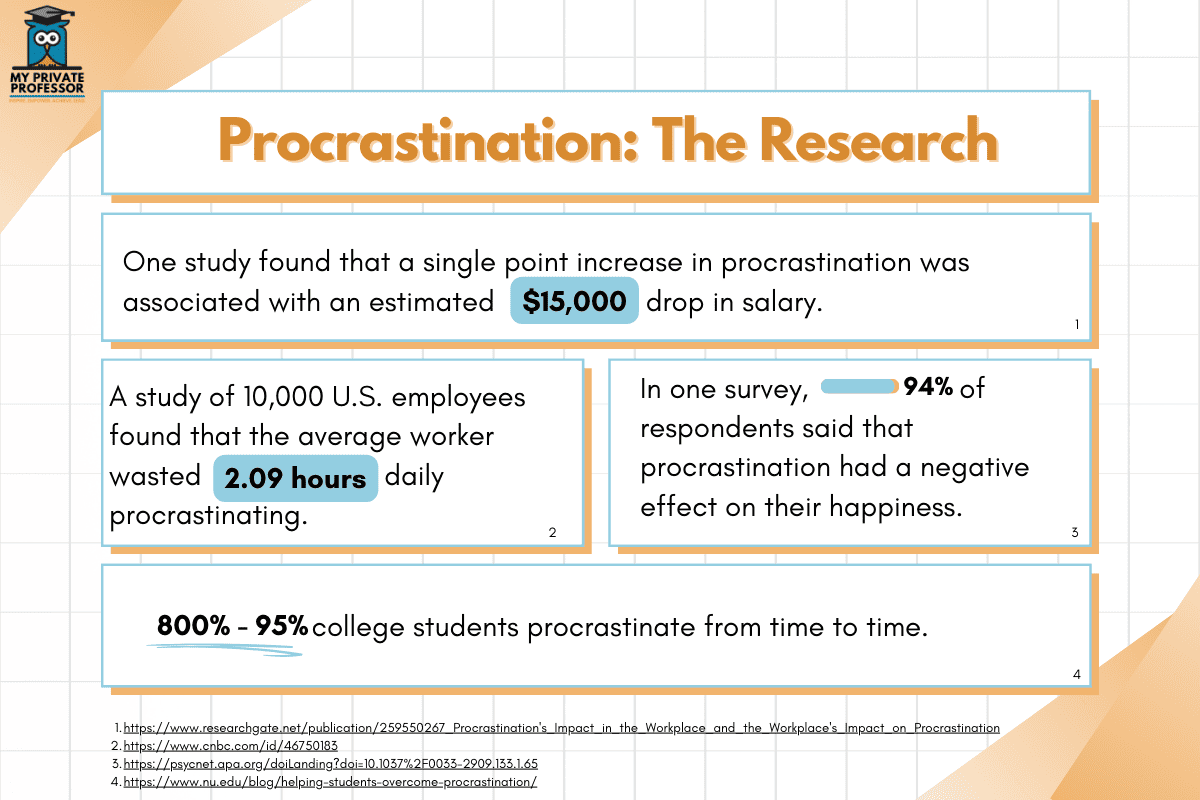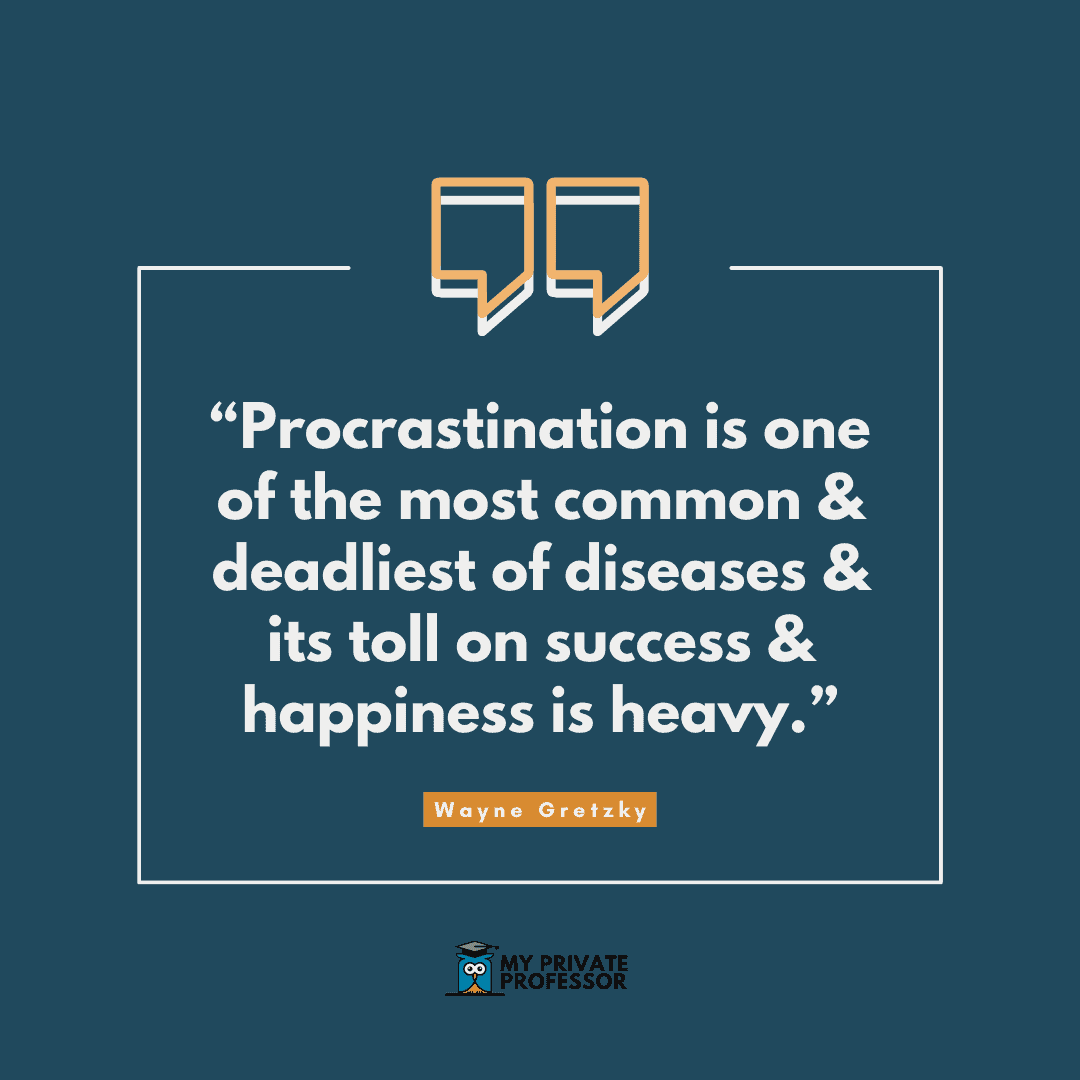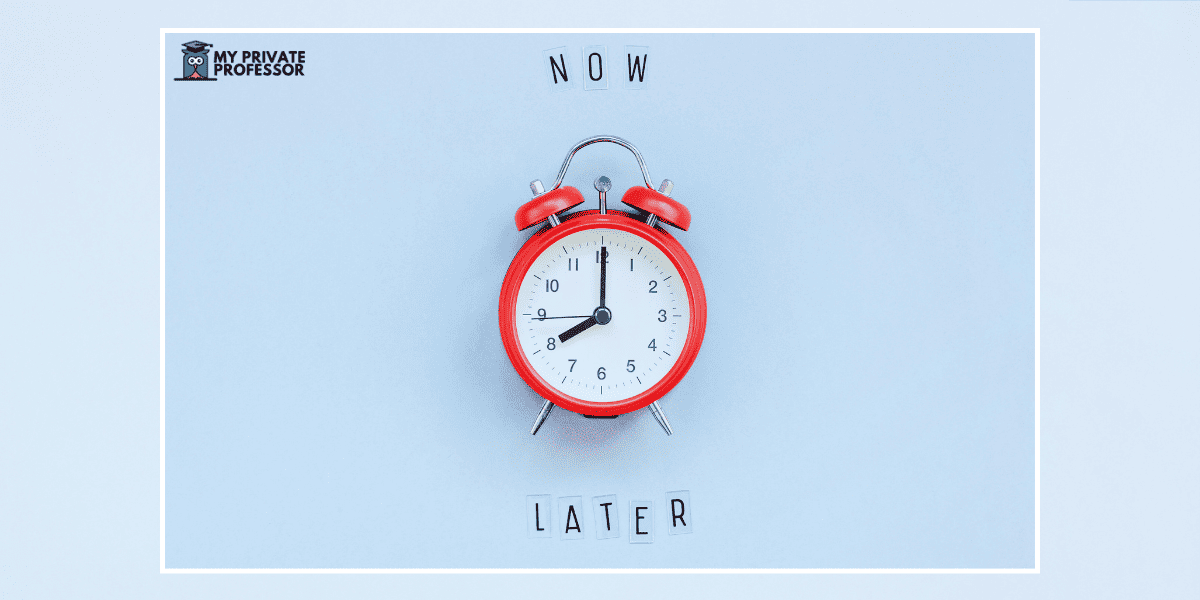Procrastinating is like texting an ex.
You know you shouldn’t do it. Yet sometimes, despite all the self-help articles that urge you to resist, you do it anyway. And when you do, you relish the temporary elation of talking with your old flame. But soon after, you regret your actions.
We like to think, as agents of our destinies, we can control our self-discipline. But as I’ve learned, this isn’t entirely true.
In thinking about times where self-discipline has failed me, I wondered, are there people who simply don’t procrastinate? People who have the willpower to always resist the temptations at their disposal?x
According to Dr. Joseph Ferrari, the APA’s main resource on procrastination, “Everyone procrastinates, but not everyone is a procrastinator.”
What he means is that almost everyone — at some point or another — procrastinates. But not everyone does it regularly (chronic procrastination).
How common is chronic procrastination?
Around 20% of adults are chronic procrastinators. Does that sound low?
Let’s put it into context.
- Around 3.8% of the population experiences depression. (World Health Organization)
- Around 16.5% of the population had a substance use disorder in the past year. (U.S. Dept. of Health and Human Services)
- Around 4.4% of American adults experience bipolar disorder at some point in their lives. (National Institute of Mental Health)
I think, to some extent, we deem procrastination a trivial issue. But as research shows, chronic procrastination has pretty major consequences (which I’ll dive into later).
Procrastination vs. laziness
Societally, we’ve adopted the notion that procrastination equals laziness, which we associate with a lack of care. But often, when we procrastinate, we actually care too much!
When you procrastinate writing your important speech, you’re anticipating and pondering, contemplating how to lay out your points. You’re mulling it over and over.
We often put so much thought into a particular task, and then, to avoid the difficult emotions that arise, we procrastinate.
Confusingly, you can be lazy and also procrastinate as a result.
When thinking about my own life, I can clearly distinguish between tasks I procrastinate because I don’t care too much about them versus those I procrastinate to avoid certain emotions.
For instance, I hate talking on the phone. Thinking about it gives me anxiety. When I’m the one who’s supposed to be calling, I often put it off. But not because I don’t care — because I feel this anxiety.
Contrastingly, I don’t hate backing up my phone. But I’ll still put it off for weeks on end! But during that time, I’m not thinking about it. It doesn’t bring me anxiety. I guess you could say I care more about a lot of other things than I do about the contents of my phone.
In the first scenario, I put off a task because of the emotions it elicited. In the second scenario, I put off the task because I simply don’t care (that much). Procrastination vs. laziness.
What’s happening, neurologically, when you procrastinate?
Essentially, the decision to procrastinate is the result of a battle in the brain.
When you sit down to start your work, two sections in your brain vie for your attention:
- The limbic system (the unconscious zone and pleasure centers)
- The prefrontal cortex (the regulator of thoughts and actions)
The limbic system pushes you away from unpleasant tasks or situations, and towards pleasant, rewarding ones. And it does this automatically. So as you’re about to begin organizing your resume, the limbic system says, “Don’t start just yet…”
Research actually shows that procrastinators have larger-than-average amygdalas. (The amygdala is a structure within the limbic system, responsible for managing emotions.)
So this tells us that first of all, procrastination might be somewhat biological. And secondly, those of us who might be deemed “procrastinators” will have to work harder to combat the issue than others.
Because when you have a larger amygdala, it’s more likely that the amygdala will override the prefrontal cortex’s operations, which results in procrastination.
The limbic system evolved for short-term survival
Research has confirmed that the limbic system — which urges us to pick the path to short-term mood repair — evolved to help us survive in the present moment.
“Procrastination is the present self saying, ‘I would rather feel good now.’ So we delay engagement even though it’s going to bite us on the butt,” explains Dr. Timothy Pychil, author of Solving the Procrastination Puzzle.
Studies have shown that indeed, when we pick a movie to watch tomorrow, we’re more likely to choose “important” films/documentaries. But when we pick a movie to watch now, we choose light comedies or popular blockbusters.
Today, this seems ridiculous — that procrastinating finally watching Citizen Kane is a survival mechanism. But we’re hard-wired to prioritize immediate survival and gratification.
“We care a lot more about the tangible present than the distant future,” researchers at Brookings explain.
Researcher Hal Hershfield has actually found that we see our future selves as more like strangers than as part of ourselves. When we procrastinate, we recognize that there will be negative consequences—but our brain tells us it’s someone else’s problem.
The problem: failure to self-regulate
Despite the common belief that procrastination is due to time-management issues or laziness, research has largely determined that the main cause of procrastination is the inability to manage your emotions.
For example, people often procrastinate because they feel unfulfilled or find a lack of meaning in their work. It’s also common to see people procrastinating when they feel worried or nervous about completing a task. Other common emotions that fuel procrastination include boredom, stress, self-doubt, aggravation, or displeasure.
Outwardly, this appears that the person doesn’t care about the task; when really, they’re experiencing somewhat of an emotional crisis.
The thing is, procrastination can turn into a toxic cycle. We procrastinate things that we know are important. Then, we feel dissonance between our intention and reality. Consequently, this can result in further avoidance of the issue.
Consequences of procrastination
Procrastination can impair students’ mental health
Mark Twain once said, “Never put off till tomorrow what you can do the day after tomorrow just as well.”
But when it comes to academics, the sentiment “As long as you get the work done, it’s all good” might be a learning myth.
One study found that procrastinators were less likely to exhibit self-compassion. This is important to recognize, because there’s a lot of evidence to show that self-compassion is a key player in reducing symptoms of depression, anxiety, and stress.
This tells us that chronic procrastination may be linked to lower levels of self-compassion, which can lead to mental health issues.
Meanwhile, research has suggested that 75% of college students are habitual procrastinators — and that this behavior can lead to issues such as stress, anxiety, and sleeping problems.
Procrastination can worsen students’ academic performance
Research has indeed found that procrastination is linked to worse academic performance. Furthermore, a 2021 paper found that students who procrastinate have a higher likelihood of dropping out and not graduating.
Another study analyzed the relationship between stress and procrastination among college students. The researchers found that the procrastinators initially had lower stress levels. But at the end of the semester, the procrastinators had greater stress and earned lower grades.
The above research tells us not only that procrastination is linked to lower academic performance, but also, that it may also be related to higher levels of long-term stress.
Procrastination can affect students’ relationships
Outside of their academic lives, students are also forming and developing social relationships. But when, time after time, you fail to show up for your 4:00 pm bakery end-of-week friend recap, it gets tricky.
Perhaps this happens as a result of previous procrastination (i.e., You procrastinated your math homework so now you can’t do something else. It could also just be the behavior that you’ve learned and adopted over time.
When you consistently fail to follow through with your commitments, you’re signaling to others that their time isn’t as important as yours. Of course, you (hopefully) don’t intend to say this.
But actions do often speak louder than words. And there comes a point where your intention doesn’t hold as much weight as the reality of the situation.
Procrastination can cause students to miss out on opportunities
If you’re a habitual procrastinator, there will inevitably come times when you’ll miss out on engagements and activities that you want to attend.
For instance, if you spend all week redecorating your dorm room and exploring your college city’s massive Target, instead of  preparing for midterms, then you might miss out on a fun party over the weekend, thrown by your good friends who spent the week preparing for midterms.
preparing for midterms, then you might miss out on a fun party over the weekend, thrown by your good friends who spent the week preparing for midterms.
What can students do?
Maybe there are times where you determine that you’re procrastinating because your schoolwork is really just not fulfilling you.
But in school, switching gears isn’t always possible.
Sometimes you just can’t get around doing that close reading of Animal Farm. So it’s important for students to garner effective tools to help reduce procrastination.
You CAN unlearn procrastination!
As you may know, the human brain is flexible, which means that it can learn and unlearn behaviors.
If you’re chronically procrastinating, chances are, you’re likely using it as a coping mechanism to deal with those negative emotions mentioned earlier.
If this sounds like you, then before you get to general, basic strategies (eliminating distractions, setting goals, rewarding yourself, etc.), you have to start tackling the emotional issues at hand.
Be honest about your procrastination
Over time, we tend to develop automatic associations between particular tasks and procrastination. So it would make sense that as a result, we develop an automatic procrastination routine.
It’s thus critical to be honest with yourself about when you procrastinate. By being more aware, you’ll be more able to understand why you procrastinate. And then, you’ll be more equipped to change your behavior.
Monitor your behavior throughout the day. When you have the urge to procrastinate, take note. Where are you? What’s the task? What feelings arise?
Separate the tasks into those you put off because you don’t care versus those that trigger certain emotions. By doing this, you can see which tasks are important to shift your behavior around.
The tasks that you procrastinate due to emotions are going to be more important to focus on, for the obvious reason that putting off these tasks negatively affects you more than putting off tasks you don’t care about.
By doing this meaningful work, you can then get to the next step of processing your feelings. I know. Sounds fun.
But the results are well worth the effort.
Process your feelings
In a world with countless distractions, it can be difficult to process your feelings. But neglecting this works to the beast’s advantage (the beast being procrastination). Because when you don’t process your feelings, you don’t give yourself the opportunity to shift your behavior.
It’s so easy to avoid facing your feelings (specifically, negative feelings. Let’s face it, it’s hard work! Seemingly, it’s during these times — when the negative feelings arise — that we tend to go into avoidance mode, seeking distraction.
We practice avoidance because, simply, it gives us that immediate good feeling. Whereas when we process our feelings, we probably won’t feel warm and fuzzy immediately.
Yet, taking the time to process feelings can lead to major long-term consequences in terms of growing and achieving our short- and long-term goals.
Tap into intrinsic motivation
If we procrastinate because we simply don’t enjoy a task, then the obvious solution is: do more tasks that we enjoy.
Enter intrinsic motivation, the drive that comes from within you—when you do something because you find enjoyment in the activity itself, rather than any external reward (money, test grade, praise, etc.).
Of course, there will always be things you’ll have to do that you don’t enjoy. Paying rent so you have a home; taking gross cough medicine to get healthy; doing laundry so you have clean clothes.
But if you have certain things in your life that you enjoy, intrinsically, you’ll likely be bringing in more positive emotions to ward off those bad feelings that cause the procrastination in the first place.
Take some time out of your day-to-day to really think about what you love. And if you feel lost, there are plenty of things you can do to identify your passions, such as exploring the library, journaling, and discussing with others.
Avoid creating massive expectations
Your brain, to some extent, can make it more likely that you procrastinate.
As much as you tell yourself that you’re not going to expect to get perfect grades in a class that you have plenty of knowledge in, you probably still devise certain expectations.
When we do create unreasonable expectations, we in turn put pressure on ourselves. And pressure can lead to overthinking, which can lead to doubt, which can lead to what? Procrastination.
The thing is, you can still think optimistically while also recognizing that nothing is ever going to be entirely in your control. Try to shift your mindset. Recognize that there will always be things outside of your control. Recognize that it’s really only you who’s expecting perfection, an outcome that’s virtually impossible to consistently achieve.
Practice self-compassion
Self-compassion — treating yourself kindly in the face of mistakes/failure — is easier for some than others. Namely, as we learned, procrastination is linked to lower levels of self-compassion.
Moreover, research shows that practicing self-compassion can reduce procrastination. If this is new to you, it can be admittedly challenging. So try doing small things. 
For instance, try to gently shift your mind when you’re thinking that you won’t be able to do something as well as you’d like. Think about how you’ll feel if you do follow through. Think about times in the past, when you’ve made mistakes, yet still came out strong.
Final thoughts
When it comes to overcoming procrastination, there’s no shortcut.
Once you’ve learned procrastination, it can become automatic. Your brain craves that immediate reward. But remember: procrastinating is about emotions.
So instead of looking to external solutions (coffee, environment change, background noise), you first need to do the emotional work. And this requires identifying the negative emotions, and then finding something positive in what you’re doing that scares away those monsters that lead you to procrastinate.
At the end of the day, immediate reward feels good, but isn’t sustainable. As Carrie Fisher once said, “Instant gratification takes too long.”







